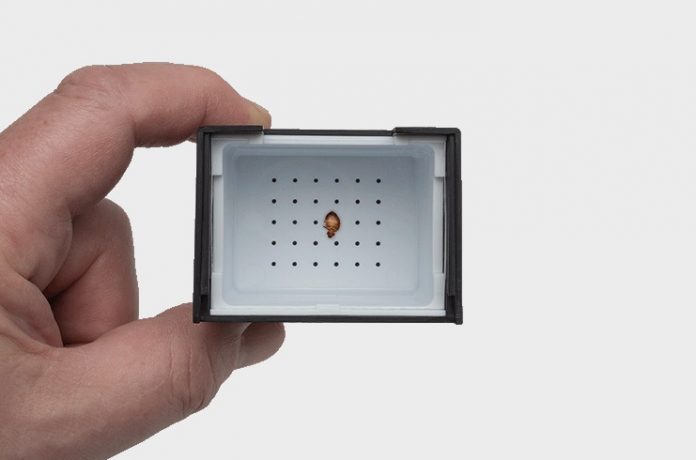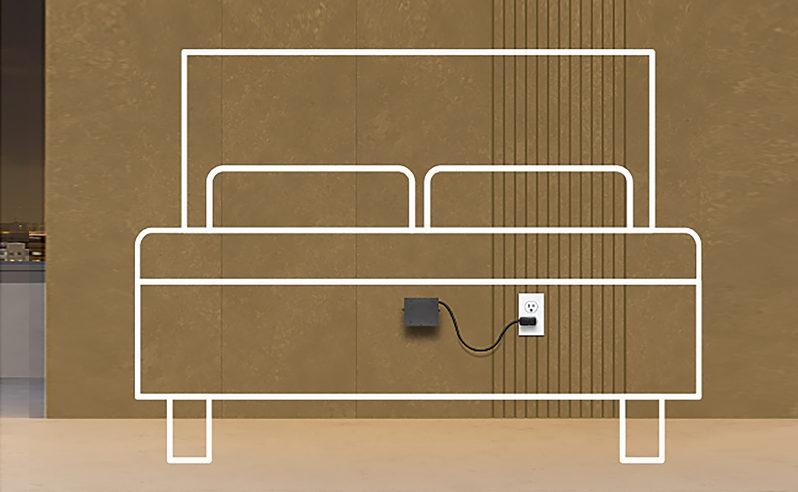
The expression “don’t let the bed bugs bite” may be more relevant today than ever before. According to a 2018 National Pest Management Association survey, a majority of pest control professionals agreed that the prevalence of pests and bed bug service work is increasing, and hotels and motels are among the top three places where professionals reported finding bed bugs.
When Ryan Bradbury owned and operated a regional pest control company in the Northeast, his biggest source of frustration was the ineffectiveness and inefficiency of the devices and strategies available for treating his clients’ bed bug problems. Intermittent human or canine inspections were slow to catch bed bugs that travelers carried into guestrooms on their outerwear or luggage, leaving many guests to tip-off hotel staff about pest problems. This scenario became increasingly problematic over the years as hotels relied more heavily on online reputations and reviews.
“These are transient hitchhiker pests,” Bradbury says. “They’re going to come into hotels. It’s what you do once you know that you have them—or what you are doing to make sure that you don’t have them—that matters.”
Bradbury no longer heads a pest control company, but he remains active in the pest control world as a director at Delta Five, a company that created an automated detection system that identifies and stops bed bugs before they become infestations. Designed for hospitality businesses, the technology aims to solve the common problems that Bradbury and hoteliers have faced for years when combating bed bugs. The Delta Five system includes the eLure—a small, silent, and odorless chamber installed on walls behind beds that attracts and traps pests. The eLure monitors individual rooms 24/7, catching and identifying bugs sooner and automatically alerting property staff in real-time so that they can expedite treatment.
“They’re going to come into hotels. It’s what you do once you know that you have them—or what you are doing to make sure that you don’t have them—that matters.”
When Bradbury first learned about this technology, he saw a silver bullet for industry and the future of pest control technology. “For hoteliers, it’s an absolute game-changer,” he says. “If you knew that at 10:04 on January 7 that you found a bug in room 202, you could do something about it a lot quicker. You’re acting with a lot more integrity, and you have the ability to take care of a problem before it becomes a true infestation.”
Delta Five’s system uses computer visioning, neural networking, and cloud technology to aggregate data, identify pests, and notify hotel staff by texting or emailing a photo with information on when and where the pest appeared. The devices are simple to install—pull back the bed, attach it to the wall with two small screws, and plug it in to connect with the hotel’s WiFi—and they attract and trap pests whether plugged in or not. The company estimates that it can install 100 eLure devices in one day. More than 21,000 devices are installed in hotels around the world today.
Because the system identifies pests as soon as they are trapped and pinpoints their location, it has the potential to dramatically change how hotels respond to and treat bed bugs. Bradbury explains, and eliminates the need for costly measures like the “wagon wheel” strategy in which a hotel treats an infested room, the adjacent rooms, and the rooms directly above and below it. By determining exactly where and when a bed bug problem originated, hotels can target their responses and act rapidly, effectively reducing the cost of treatment, the number of rooms out of commission, the use of pesticides, and the disruption caused to guests in the process.

On top of giving hotels the tools to more effectively treat bed bugs, this technology is generating property-wide and portfolio-wide data on pests that hotels did not have access to before. Deb Woods, chief product officer at Delta Five, is a trained electrical engineer and computer scientist who oversees the hardware and software side of the business. When she first started at the company, Woods quickly discovered that hoteliers had limited access to their own data; properties often stored pest reports and treatment records in binders and paper logs.
Today, hotels are moving towards more digital, data-driven solutions. In the pest management space, digital records and searchable tickets give hotels immediate access to information on where and when pests occured, what type, who found them, the last time a room was treated, and more. Software can then analyze that data and provide valuable insights. For instance, Delta Five’s system can track a hotel’s pest control budget, what it is spending on regular pest management contracts, and reactionary costs, like refunding a guest who encountered a pest issue.
“Having that data at your fingertips is just phenomenal,” Woods says. “It gives hoteliers a very quick view of how their hotel is performing around pests and issues around cost, compliance, and how guests are being impacted—instead of having to flip through multiple binders to find this information.”
Digital pest management systems also give hotels the ability to connect Internet of Things (IoT) devices with software and automate bed bug reporting and treatment. Delta Five’s software syncs with its in-room eLure devices to automatically generate a new ticket when a pest has been trapped. Built with open APIs, the system can integrate with a hotel’s existing software, sharing data across departments, as well as with pest management software.
Woods sees a future of integrated, digital pest management that is powered by increasingly sophisticated devices and software. “Our focus has been on bed bugs, but our direction with this tool and the software is to start tracking different pests in the hotel,” Woods says. “There’s been so much talk about integrated pest management, and not a lot of good solutions for it. I think this is certainly helping to move the market that way.” Woods adds that hotels can set up Delta Five software to automatically alert pest management companies when one of its eLure devices traps a bug, improving service and response time and strengthening the relationship between a hotel and its pest control provider.
Ultimately, Woods says that this kind of technology gives hotels the tools they need to deliver better service to guests and differentiate their properties from competitors. “If hoteliers are providing a pest-free, green environment using fewer chemicals, they’re providing a better service for guests coming to stay in their hotels,” she explains. Bradbury adds that the ROI for technology like this is not always measurable and comes with intangible benefits like limiting a hotel’s negative online exposure and keeping guests, staff, and spaces pest-free. “We all know that when you stay at a hotel you have a lot of options,” Bradbury says. “You don’t want something like this to be a reason guests are avoiding your hotel.”
Sponsored by Delta Five












Why is there no narrative in the article about cost/benefit to the hoteliers and a list of all of the tech-companies (vendors) developing this technology? There is more than one… Or is this an infomercial for one company? It appears it will help find them sooner but we still have to heat treat each room as before. So if I have 400 rooms, what is the investment in equipment, and time? I have to compare this investment to our current combination of inspection training, inspections, and pest cotrol investment such as bed bug sniffing dogs and pest control inspectors. What can I stop doing and not stop doing??
Jim — Thank you for your comment. This article is sponsored by Delta Five.